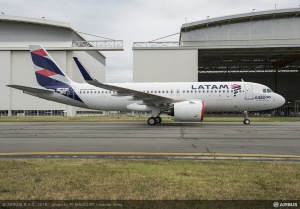Rio 2016: LATAM begins special Olympic operations

This week marked the official start of LATAM Airlines Brazil’s special operation for the Rio 2016 Olympic and Paralympic Games throughout Brazil’s main airports.
A total of more than 100 special operational initiatives were developed to efficiently serve the fans and delegations, and maintain service quality for all passengers travelling with the airline in the months of August and September.
The main focus is to guarantee on-time and safe operation throughout the event, paying special attention to the opening and closing weekends, when Rio de Janeiro will welcome an influx of passengers in its two airports (Santos Dumont and Galeão).
LATAM Airlines Brazil expects to serve around a quarter of the public using air to travel to the games.
Of the 4,500 Paralympic athletes, 30 per cent are expected to travel on LATAM aircraft.
The company has invested R$20 million in the operation, with R$15 million allocated for special operational initiatives and R$5 million to resolving potential contingencies.
ADVERTISEMENT
“This is the logistics operation of the world’s biggest event, and we are ready to provide fast service to athletes, take care of all passengers, accommodate special cargo and coordinate mass departures and arrivals, which will be concentrated in specific days and in a single city,” said Eduardo Costa, services and innovation director at LATAM Airlines Brazil.
Implemented one year ago and developed by a multidisciplinary team, the company’s preparation for the operation at the Rio 2016 Olympics included three company exercises and another two in partnership with the Civil Aviation Department at the airports in São Paulo (Congonhas and Guarulhos) and Rio de Janeiro (Santos Dumont and Galeão).
They tested scenarios of concentrated demand, transfer processes and specific logistics for mobility items.
The exercises were based on the best practices of other airline groups as well as airline and airport operators that have already served the public in previous games.
In addition, over 1,000 employees in the airport, baggage and boarding areas were trained to handle mobility items, to operate ambulift and lifting platforms and to provide services to passengers with disabilities.
Furthermore, the airline reinforced and expanded its oversight and control of safety procedures and intensified training to teams in all aspects related to safety.
The carrier works on a coordinated and integrated basis with all agencies of the aviation safety system, including government and private agents from the operating and intelligence areas - both in Brazil and abroad.
It also participated in specific forums for the preventive planning of its operations.

